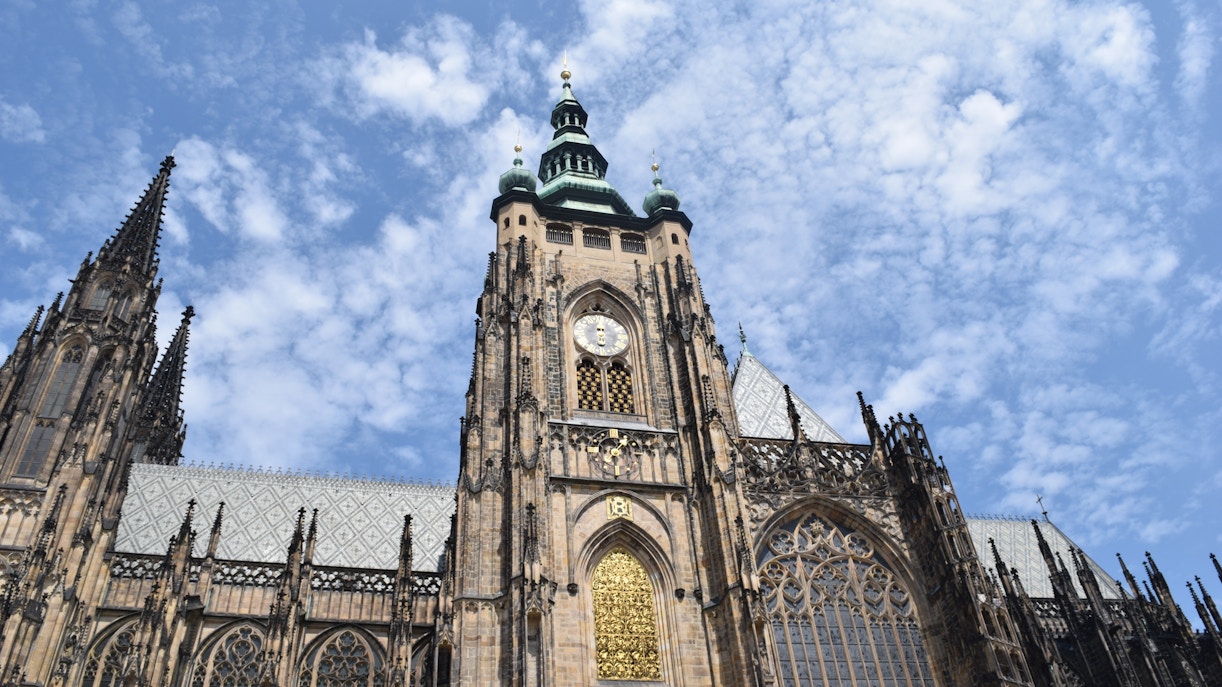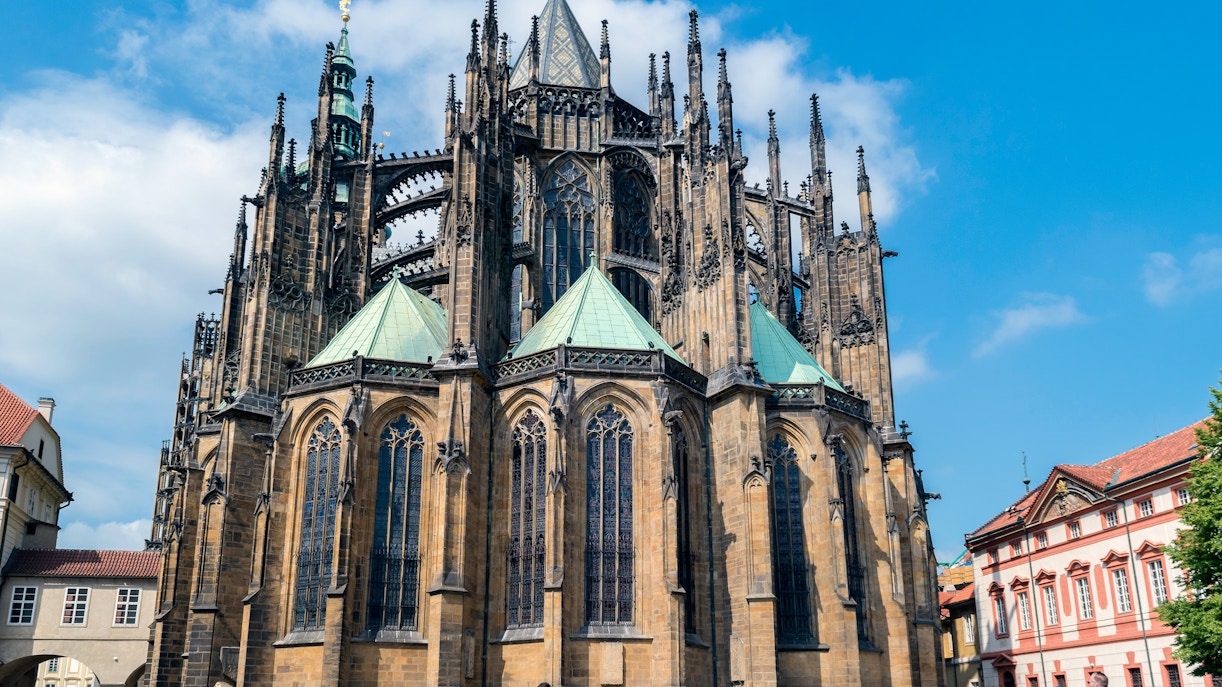- Prague Castle
- St. George Basilica
- Old Royal Palace
- St. Vitus Cathedral
- Powder Tower
- History
- Inside
- Old Castle Stairs
- Bohemian Crown Jewels
- Deer Moat Prague
- Golden Lane
- Prague Castle Photos
- Gardens
- Plan Your Visit
- Skip the Line Tours
- Guided Tours
- Night Tours
- Timings
- Directions
- Entrances
- Facts
- Map
- Combo Tickets
St. Vitus Cathedral Tickets & Tours
Quick facts about St. Vitus Cathedral

- Official name: St. Vitus Cathedral
- Location: Prague Castle, Prague, Czech Republic
- Date of opening: 1344 (construction began)
- Timings:
Summer Season: 9 AM to 5 PM
Winter Season: 9 AM - 4 PM - Architect: Matthias of Arras, Peter Parler, and more.
- Architectural style: Gothic (with elements of Baroque and Renaissance)
- UNESCO World Heritage Site: Yes (since 1992)
- Number of visitors per year: Over 2 million
Why visit St. Vitus Cathedral?

- Iconic landmark: Explore the most important and recognizable religious monument in the Czech Republic.
- Historical significance: Learn about the cathedral's association with the Bohemian kings and queens, including the coronation site of Czech monarchs.
- Gothic architecture: Explore the Gothic style St. Vitus Cathedral architecture, a true masterpiece that took the expertise of several architects to be built.
- Historical artifacts: Encounter historical treasures, such as the Crown Jewels of the Bohemian Kingdom, housed in the Crown Chamber of the cathedral.
- Divine atmosphere: Immerse yourself in the peaceful ambiance and spiritual significance of this sacred place offering a refuge from the bustling city.
- Heavenly views: Ascend the bell tower for breathtaking panoramic views of Prague Castle, the city skyline, and the Vltava River.
What’s inside St. Vitus Cathedral, Prague?

The Stained glass windows
A kaleidoscope of color
Immerse yourself in the mesmerizing beauty of St. Vitus Cathedral's stained glass windows. These kaleidoscopic works of art depict biblical scenes and saints, flooding the interior with a glorious array of hues. Witness the interplay of light and color that creates a truly enchanting ambiance.

The Royal Mausoleum
Resting place of kings
The Royal Mausoleum is where Czech kings and queens found their eternal repose. Pay homage to the illustrious rulers who shaped the nation's history as you wander through this solemn space. The tombs, adorned with exquisite stone carvings, serve as a poignant reminder of the monarchy's legacy.

The Great South Tower
Panoramic views of Prague
Ascend the St. Vitus Cathedral tower to catch breathtaking panoramic views of Prague. Climb the winding staircase, and your efforts will be rewarded with a sweeping vista of the city's rooftops, spires, and the majestic Vltava River. This bird's-eye view will leave you in awe of Prague's architectural splendor.

The Golden Portal
An entrance fit for royalty
Prepare to be awe-struck as you pass through the magnificent Golden Portal. This ornate entrance, adorned with intricate sculptures and gilded details, welcomes visitors with regal splendor. Step into a world where craftsmanship meets grandeur and makes you feel like royalty.

The Main Nave
Heavenly heights
Enter the majestic main nave of the cathedral, where soaring ceilings and towering columns create a sense of heavenly grandeur. Let your gaze wander upwards, and be captivated by the intricate ribbed vaults that seem to touch the heavens themselves.

The Chapel of St. Wenceslas
A sanctuary of serenity
Step into the tranquil embrace of the Chapel of St. Wenceslas within the cathedral. Adorned with precious gemstones and intricate woodwork, this sanctuary exudes a sense of peace. Take a moment to reflect, admire the craftsmanship, and pay homage to the patron saint of the Czech Republic.

The Crown Jewels
Treasures of the Nation
Marvel at the glittering Crown Jewels, displayed in all their regal glory. These symbols of Czech sovereignty include the Crown of Saint Wenceslas, the Royal Scepter, and the Coronation Mantle. Let the magnificence of these priceless treasures transport you to a time of kings and queens.

The Giant Bell
The heartbeat of the Cathedral
Listen for the resounding toll of the Giant Bell, the sonorous heartbeat of St. Vitus Cathedral. This colossal bell, named Sigismund, weighs a staggering 15 tons and is an emblem of Czech national pride. Let its deep resonance reverberate within you, filling you with a sense of awe and reverence.
St. Vitus Cathedral history

- The construction of the present-day Gothic Cathedral started on 21 November 1344. King John of Bohemia laid the foundation stone for the new building, and construction later continued under the reign of Charles IV.
- Mathew of Arras and Peter Parler were the two architects who worked on the construction of St. Vitus Cathedral in Prague Castle.
- However, the construction work came to a halt when a new king, Charles's son Wenceslas IV, came to power. Moreover, when the Hussite War broke out in 1419, St. Vitus Church stood unfinished for almost 600 years! The war and a destructive fire heavily damaged parts of the cathedral and its furnishings.

- Only in the latter half of the 19th century was the construction completed in a Neo-Gothic style.
- In 1844, Václav Pešina, with Neo-Gothic architect Josef Kranner presented a program for the renovation and completion of the cathedral at a gathering of German architects in Prague.
- Finally, the church was solemnly consecrated in 1929 at the time of St. Wenceslas's jubilee, and even in subsequent years, its interior underwent further enhancements.
St. Vitus Cathedral Today

- St. Vitus Cathedral has witnessed countless significant events, including royal coronations, weddings, and even religious services through the centuries. It has survived wars, political changes, and the test of time, standing tall as a testament to the city's enduring spirit and faith.
- The St. Vitus Cathedral architecture is considered a stunning work of art today, attracting millions of visitors annually. Its soaring spires and majestic facade dominate the Prague skyline, beckoning all who come to explore its hallowed halls.
- Beyond its sheer beauty, the St. Vitus Cathedral holds immense cultural and religious importance. It remains the seat of the Archbishop of Prague, symbolizing the spiritual heart of the Czech Republic.
St. Vitus Cathedral photos








Plan your visit to St. Vitus Cathedral

St. Vitus Cathedral opening hours are:
Summer Season (April 1 - October 31) timings:
- Monday - Saturday: 9 AM – 5 PM
- Sunday: 12 PM - 5 PM
Winter Season (November 1 - March 31) timings:
- Monday - Saturday: 9 AM – 4 PM
- Sunday: 12 PM - 4 PM
Closed on: December 24
Best time to visit: The best time to explore this architectural marvel is during the early morning or late afternoon when the crowds are thinner. Plan your visit on weekdays to beat the rush and enjoy the breathtaking beauty of the cathedral peacefully.

Address: Hradčany, 119 08 Prague 1, Czechia
Location: St. Vitus Cathedral is located in the heart of Prague Castle in the III courtyard. If you enter through the I or II courtyard entrance, the cathedral will be the first historical building you will come across inside the castle.
Getting to Prague Castle
Buy Prague Castle tickets with access to St. Vitus Cathedral
Frequently asked questions about St. Vitus Cathedral
St. Vitus Cathedral is a magnificent Gothic cathedral located within the Prague Castle. It is the largest and most important church in the Czech Republic, serving as a spiritual symbol and a national treasure.
Construction of St. Vitus Cathedral began in 1344 and continued for several centuries, with different architectural styles incorporated over time. The cathedral was finally completed in 1929.
St. Vitus Cathedral is located within Prague Castle, a historic fortress complex perched atop a hill in the heart of Prague, Czech Republic. The address is Hradčany, 119 08 Prague 1, Czech Republic.
You can purchase Prague Castle tickets providing access to the St. Vitus Cathedral and many other buildings and attractions within the castle complex. Buying tickets in advance online is recommended to avoid long queues.
Yes, your Prague Castle tickets include access to St. Vitus Cathedral.
St. Vitus Cathedral was designed by several architects throughout its construction, but the most notable figure associated with its design is Peter Parler, a renowned Gothic architect.
While there is no strict dress code, it's advisable to dress modestly when visiting St. Vitus Cathedral out of respect for its religious significance. Please avoid wearing revealing or offensive clothing.
Yes, photography is allowed inside the cathedral, but without flash.
Yes, St. Vitus Cathedral is wheelchair accessible. However, due to the historical nature of the building, some areas may have limited accessibility.
Yes, Prague Castle guided tours are available. These tours are highly recommended for a more enriching experience. Knowledgeable guides will take you through the cathedral's history, architectural highlights, and stories behind its magnificent artworks.
It's best to visit St. Vitus Cathedral early in the morning or later in the afternoon to avoid crowds. Weekdays also tend to be less crowded compared to weekends.
Absolutely! Prague Castle itself offers a wealth of attractions, including the Old Royal Palace, Golden Lane, and the Basilica of St. George. Explore the castle complex and enjoy breathtaking views of Prague from the beautiful Prague Castle gardens.



